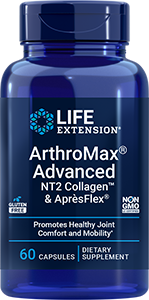
How to Support Your Joint Health
Published: June 2021
Our bodies keep us going—whether that means replenishing our energy while we sleep to better prepare us for the day ahead, or keeping our blood pumping through our hearts. And when you think about how our body (literally!) keeps us going, joint health is at the center of it all.
Healthy joints truly are a pillar of your overall health, so when we start to get less limber as we age, we may notice other declines, too. But you can keep your joints moving in the right direction at any age with responsible habits and smart supplementation. Here are our top tips.
1. Eat foods that support joint health

Treating the body as a connected unit through proper nutrition is key to overall wellness—and beyond that, there are some foods that offer specific benefits to joint health. Promoting a healthy inflammatory response is especially important for supporting joint health—and you'll find some tasty options right in your grocery store that will help you move freely and comfortably.
Many of these joint-friendly foods are included in the Mediterranean diet, which is inspired by traditional foods that are common staples in the Mediterranean region, particularly in Greece. This diet focuses mostly on unprocessed, whole foods rich in fruits, vegetables, legumes, whole grains, olive oil, and especially fish.
While it is known for many benefits—including brain and heart health—it's worth noting that the Mediterranean diet also has been studied for supporting a healthy inflammatory response, while providing plenty of vitamins, minerals, fiber and healthy fats that contribute to easy, youthful movement.
Even avid followers of the Mediterranean diet may wonder whether they're getting enough benefits through food intake alone, though. Suggestion: consider incorporating an omega-3 fish oil alongside the rainbow of colors on your plate.
Pro tip: Get plenty of calcium!

Remember those "Got Milk?" advertisements from the 90s about making sure you have enough calcium in your body? If so, it should be no surprise that calcium is on our list of top movement-friendly supplements.
Known primarily for its benefits for bone health, a diet that includes enough calcium helps maintain bone strength for years. And since healthy joints are useless without healthy bones, it makes sense to maintain the health of both. Some calcium rich foods include yogurt (also a healthy source of probiotics), dark leafy veggies like kale, and, believe it or not, the Mediterranean diet mainstay, salmon.
2. Exercise your way to healthier joints

When you think about what is good for supporting joint health, it probably isn't surprising that maintaining a healthy weight through regular exercise is high on the list. If we want to support our body's efforts to keep us in forward motion, fitness needs to be part of our everyday lives.
First and foremost, remember to warm up. While a warm up stretch may not be that Warrior 3 pose you've been working so hard on perfecting (more on yoga later), it is still crucial to always stretch before any kind of physical exertion or activity. Starting slowly and letting your joints adjust to the sensation of moving your body not only helps protect your joints from occasional discomfort later, but also helps you get the most out of your workout.
Pro tip: Strength training is surprisingly good for joints!
When you think of joint health, you probably don't immediately think of your abs, but maintaining a strong core through abdominal exercise is a lesser-known but great way to help benefit your joint health and strength. Strong core muscles are an essential part of supporting balance and keeping you upright.
No matter what workouts you choose, check in with yourself periodically during your sweat session to make sure you're practicing proper form and not overexerting yourself. Your joints will thank you for knowing your limits and working within them!
Low-impact exercises are great for all fitness levels

While regular strengthening exercises are great for joint health, there's something to be said for low impact exercises that help relieve occasional stiffness that can come from staying still too long.
Stretching every day helps ensure that you're warming up your joints, encouraging healthy range of motion and keeping your joints moving in a gentle and intentional way. One of the most popular ways to stretch, yoga, is a health benefit superstar in its own right! Yoga is an excellent option to stay limber that has major benefits for your body, while supporting the mind-body connection. And who wouldn't want to promote a healthy stress response while keeping joints healthy and happy?
By honoring your inner warrior with poses like Triangle, Cat-Cow, Cobra, and even Warrior and its variations, you are also honoring your health with the benefits of flexibility, healthy mobility, supported posture—and even the balance you've worked so hard on with your ab exercises! Not quite a seasoned yogi? No problem. Yoga is designed to adapt to your skill and comfort level.
Don't forget: Cardio is great for joint health, too!
If you thought these recommendations to focus on strength and low-impact exercises meant you could skip cardio, all we can say is…not so fast. (Or should we say: speed up!) Aerobic exercise shouldn't be overlooked when it comes to healthy activity to support joints.
Whether you run, dance or kick-box your way to an elevated heart rate, cardiovascular exercise helps support healthy blood flow, which in turn helps keep cartilage supported. Some great aerobic exercise options that offer added cardiovascular benefits include swimming, biking, and even just walking.
Getting up and putting your body in motion with aerobic exercise helps maintain the structural integrity of your joints and promote healthy flexibility.
Explore Our Best Joint Health Supplements
3. Choose joint support supplements

You're probably thinking, "My diet is in check and I'm a frequent exerciser,"aka you're already doing everything you can to support your joint health. While these are the fundamental true north ways to support joint health, supplementation can help give you the extra peace of mind that you're doing everything you can with joint health supplements to take your healthy lifestyle to the next level.
While there are certain vitamins, like vitamin K, that offer benefits for your joints, you might be wondering what to take for more specialized support.
Colla-genius! Collagen is a smart choice for joint health
Collagen is a structural protein that makes up about one third of the protein in your body. It helps support the elasticity of the skin, but did you know that it helps maintain the structural integrity of your joints as well?
Collagen for joint health is particularly important because collagen makes up articular cartilage, which functions as the tissue covering the ends of bones and the joints, which allows them to move smoothly and comfortably against one another. But collagen levels decline over time with normal aging and whole collagen is not easily absorbed by the body.
Incorporating hydrolyzed collagen into your supplement routine can help fill in those gaps and support cartilage health. It can be taken in capsule form, but collagen is more often found unflavored and in powder form, making it a versatile supplement to add to anything, even your morning cup of Joe!
Glucosamine and chondroitin: The healthy aging power combo

Glucosamine and chondroitin are also two nutrients to consider adding to your supplementation routine to maintain healthy joint cartilage, an often-overlooked aspect of joint health.
Glucosamine is an amino sugar that is an important component of cartilage health in particular. While it is found in abundance in your joints, there's no easy way to get glucosamine from your diet. And since this nutrient also declines over time in the body, it's a wise choice to supplement with glucosamine to maintain healthy levels of this nutrient to support healthy aging joints.
Chondroitin is a compound that is found in cartilage that helps it retain water and stay lubricated, and, like the combo of cheese and fine wine, is part of a perfect pairing with glucosamine, since they're both part of the structural components of cartilage. While the wine and cheese should be had in moderation, supplementing every day with this pairing is a beneficial choice. Together, these two can help promote joint lubrication and comfort, and help keep your joints cushioned, no matter what life throws at you!
The body is an orchestra of different functions that make up the symphony that is you. Working synergistically to keep you healthy, it's all about a healthy balance when it comes to supporting your wellness. It's a lifelong venture, but it's important to be proactive and follow the tips to maintaining healthy joints, so you can truly go the distance for whole-body harmony. FYI: Do not overlook your bone health supplements!
References
- Ambardekar, Nayana, MD. "Is Glucosamine Good for Joint Pain?" WebMD, September 2020, https://www.webmd.com/vitamins-and-supplements/supplement-guide-glucosamine
- Carroll, Chrissy, RD, MPH. "What Is the Mediterranean Diet?" VeryWellFit, November 2020, https://www.verywellfit.com/mediterranean-diet-overview-2506730
- Delzell, Emily. "Calcium Needs for People with Arthritis." Arthritis.org, https://www.arthritis.org/diseases/more-about/calcium-needs-for-people-with-arthritis
- Dyer, J et al. "Effect of a Mediterranean Type Diet on Inflammatory and Cartilage Degradation Biomarkers in Patients with Osteoarthritis." The journal of nutrition, health & aging, September 2016, https://www.ncbi.nlm.nih.gov/pmc/articles/PMC5405095/
- Watson, Stephanie. "Collagen: Can It Really Help With Skin and Joints?" Radiance by WebMD, March 2021, https://www.webmd.com/beauty/news/20210331/collagen-can-it-really-help-with-skin-and-joints
- "Dive in for joint health." Harvard Health Publishing, Harvard Medical School, July 2019, https://www.health.harvard.edu/staying-healthy/dive-in-for-joint-health
- "Glucosamine and Chondroitin for Osteoarthritis." NIH National Center for Complementary and Integrative Health, https://www.nccih.nih.gov/health/glucosamine-and-chondroitin-for-osteoarthritis




